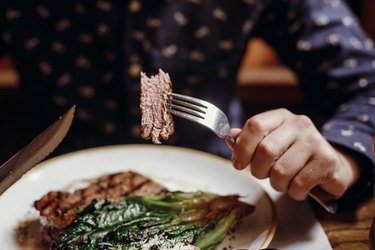
Do you get stomach pain after eating red meat? Tucking into this food group — which includes beef from cows as well as lamb, pork and processed options like sausage, pepperoni and bacon — may cause belly cramps, nausea, diarrhea and vomiting for some people.
But getting to the bottom of this issue can be tricky, as there are several possible reasons for the discomfort.
Video of the Day
Video of the Day
For example, you may have eaten something else along with that burger that's setting your stomach aflame, such as alcohol, dairy or fried foods. And there are literally dozens of reasons out there for a case of abdominal pain, per the Mayo Clinic.
Learn more about the connection between stomach pain after eating red meat, including the likely culprits behind it and some stress-free ways to ease — and maybe even avoid — the pain.
1. Food Intolerance
Stomach pain after eating red meat could be a sign of a food intolerance, according to the Cleveland Clinic, which means your body has a hard time breaking down this specific food group.
While this typically results in bad gas after eating red meat, other signs of a food intolerance include:
- Bloating
- Cramping
- Nausea
- Heartburn
- Vomiting and/or diarrhea
- Headache
- Feeling irritable or nervous
Fix It
If red meat causes nausea or other digestive symptoms every time you eat it (a food diary can help you keep track), you may have a meat intolerance.
There is no cure for a food sensitivity or intolerance, so your best option is to avoid eating the problem food. Then, you can make dietary adjustments toward a non-red meat diet, or even plant-based diet.
If you're unsure how to structure your diet without red meat, consider meeting with a registered dietitian to help you make a nutritious plan.
2. Red Meat Allergy
Tummy pain or indigestion from red meat could mean you have an allergy to this food group, according to the American College of Allergy, Asthma & Immunology (ACAAI), although this type of food allergy is not very common.
Other symptoms of a red meat allergy can include:
- Vomiting and/or diarrhea
- Coughing, wheezing or shortness of breath
- Hives
- Feeling dizzy or confused
This kind of allergy can develop at any age, per the ACAAI. And sometimes it can be the result of a bite from a Lone Star tick (known as Alpha-gal syndrome), per the Mayo Clinic.
Fix It
If you think you have a red meat allergy, see your doctor or an allergist, who can get you tested and talk you through your treatment options.
If you need to avoid red meat, try eating poultry (chicken or turkey) instead, or opt for plant-based sources of protein like tofu, beans and eggs.
Warning
Rarely, a food allergy can lead to anaphylaxis, a life-threatening reaction marked by shock and difficulty breathing. Get medical help immediately if you notice these symptoms.
3. Digestive Diseases
You're not alone if a digestive disorder is the cause of your stomach pain after eating steak. In fact, digestive diseases affect an estimated 60 to 70 million Americans, according to the National Institute of Diabetes and Digestive and Kidney Diseases.
One digestive issue in particular that causes stomach pain is diverticulitis, an inflammation of one or more of the small pouches in the gastrointestinal tract, per the Mayo Clinic.
One March 2018 study in Gut looked at red meat consumption and the risk of diverticulitis and found that eating more was associated with an increased risk of diverticulitis.
"This small study could be of concern to meat-lovers, but there needs to be more direct data," says Jacqueline Wolf, MD, a gastroenterologist and associate professor at Harvard Medical School.
"A prospective study that compares people on a meat diet with those who aren't is the next step here, but there could potentially be a change in the gut microbiome in people with diverticulitis who eat a lot of meat," she says.
According to the Mayo Clinic, other signs of diverticulitis include:
- Abdominal tenderness
- Nausea and/or vomiting
- Fever
- Constipation (sometimes diarrhea, but that's less common)
Fix It
Talk to your doctor, who can diagnose diverticulitis and discuss treatment options.
In some cases, you may need antibiotics to treat diverticulitis, but for others, a liquid diet for a few days should allow your gut to slowly heal itself, per the Mayo Clinic.
4. Gastritis
Another reason you may have stomach pain could be due to a case of gastritis. This is an irritation of the stomach lining, per Johns Hopkins Medicine, which can be caused by a bacterial infection, an autoimmune disorder, the long-term use of pain medications and more.
Fix It
To treat the typical symptoms of gastritis, which include gastrointestinal discomfort, indigestion, heartburn and abdominal pain, you might want to eat smaller, more frequent meals and avoid fatty foods (including red meat), per the Mayo Clinic.
5. Food Poisoning
Besides other meat-related stomach problems, there's a chance you may have only eaten meat once and gotten sick. This could mean that you got food poisoning due to a foodborne illness.
Food poisoning usually happens when the food you eat is contaminated with bacteria, parasites or viruses.
Typical symptoms of food poisoning include the following, per the Centers for Disease Control and Prevention (CDC):
- Upset stomach and cramps
- Nausea
- Diarrhea and/or vomiting
- Fever
The two most common bacteria behind it include E. coli and C. perfringens. "E. coli is from undercooked beef and can cause stomach pain and other GI symptoms, while C. perfringens is a toxin that can be found in contaminated beef," Dr. Wolf says.
Fix It
Unfortunately, time is the best cure for food poisoning. Just make sure to stay hydrated until your symptoms go away. And call your doctor if your symptoms persist for more than a couple days.
6. A Bug
Keeping track of what you ate and when you started having symptoms is one way to pinpoint stomach pain after eating red meat. But in some cases, your discomfort may not even be related to your diet.
Certain types of sickness, like the flu, are known to cause fever, aches, chills and a stuffy nose, per the CDC, but abdominal discomfort, like nausea and vomiting, are also possible signs of this seasonal illness.
And according to an August 2020 study in Gastroenterology, done by Stanford Medicine, it's not uncommon for people with COVID-19 to get gastrointestinal distress.
Fix It
If your symptoms are mild, stay home and avoid contact with other people, per the CDC.
If your symptoms are severe or you're in a high-risk group (including pregnant people and older adults), call your doctor, who may prescribe an antiviral medication.
Remedies for Stomach Pain After Eating Beef
Belly discomfort is no picnic, of course, but if you're looking for a remedy for stomach pain after eating beef, the fix is about the same as for other cases of mild GI distress.
Here are some strategies to try:
- Sip clear liquids: If red meat causes diarrhea, drink clear liquids, like water and broth, to stay hydrated until your symptoms go away, per the Cleveland Clinic.
- Nix solid foods: Skip solid food for the first few hours after symptoms appear and avoid high-fat foods or ones that are fried or greasy, as these may cause GI discomfort, per Harvard Health Publishing.
- Try mint: "If your symptoms aren't severe, you could try Pepogest ($9.31, Amazon) or another mint product before eating," Dr. Wolf says.
- Get some rest: If steak causes diarrhea or other issues, the best remedy may just be some good ol' down time. The reason? Sickness, dehydration, stomach pain and more can drain your body of energy.
When to See a Doctor
If your connection between meat and abdominal pain is unclear to you, talk to your doctor about your symptoms and when they began. You may have red meat intolerance symptoms, which would require you to avoid eating red meat altogether.
Similarly, if you're having trouble coping with stomach discomfort, call your doctor. They can help treat the underlying cause and get you feeling better.
FAQ
Common Questions
Why does ground beef hurt my stomach but steak doesn't?
Besides maybe cooking ground beef with more oil/grease than steak (which may cause stomach issues), the process of grinding up beef also creates more surface area, which means more places for microorganisms to hide.
As a result, ground beef can go bad more quickly than steak, per the Cleveland Clinic. In other words, if your ground beef is not fresh, it could cause stomach issues.
How long does red meat stay in your gut?
The exact time it takes to digest red meat will vary from person to person. On average, though, it takes about six to eight hours for any food to pass through your stomach and small intestine. Then it takes about 36 hours for food to move through your entire colon, depending on the person, per the Mayo Clinic.
How do I get tested for a meat allergy?
If your doctor thinks you might have a meat allergy, they will refer you to an allergist. They will perform either a skin prick test or a blood test to determine whether you are allergic. The blood test will detect the IgE antibody to the specific food being tested, per the ACAAI.
- Mayo Clinic: "Abdominal Pain"
- Harvard Health Publishing: "Is Something in Your Diet Causing Diarrhea?"
- Centers for Disease Control and Prevention: "Flu Symptoms & Complications"
- National Institute of Diabetes and Digestive and Kidney Diseases: "Digestive Disease Statistics for the United States"
- Cleveland Clinic: "Clear Liquid Diet"
- Johns Hopkins Medicine: "Gastritis"
- Mayo Clinic: "Gastritis"
- Gut: "Meat intake and risk of diverticulitis among men"
- Cleveland Clinic: "Food Problems: Is it an Allergy or Intolerance"
- American College of Allergy, Asthma & Immunology: "Meat"
- Mayo Clinic: "Alpha-gal syndrome"
- Mayo Clinic: "Diverticulitis"
- Centers for Disease Control and Prevention: "Food Poisoning Symptoms"
- Cleveland Clinic: "Has My Ground Beef Gone Bad?"
- Mayo Clinic: "How long does it take to digest food — from the time you eat it to the time you excrete it?"
- Gastroenterology: "High Prevalence of Concurrent Gastrointestinal Manifestations in Patients With Severe Acute Respiratory Syndrome Coronavirus 2: Early Experience From California"
Was this article helpful?
150 Characters Max
0/150
Thank you for sharing!
Thank you for your feedback!
Is this an emergency? If you are experiencing serious medical symptoms, please see the National Library of Medicine’s list of signs you need emergency medical attention or call 911.
